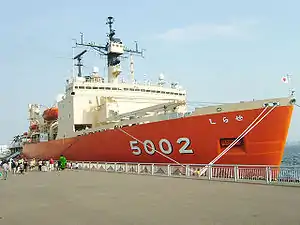 | |
| History | |
|---|---|
| Name |
|
| Namesake | Shirase Glacier |
| Ordered | 1979 |
| Laid down | 5 March 1981 |
| Launched | 11 December 1981 |
| Commissioned | 12 November 1982 |
| Decommissioned | 30 July 2008 |
| Homeport | Yokosuka |
| Status | Under remodeling into observation and exhibition facility |
| Class overview | |
| Preceded by | Fuji class |
| Succeeded by | Shirase class (2008) |
| General characteristics | |
| Type | Icebreaker |
| Displacement | 11,600 long tons (11,786 t) |
| Length | 134 m (439 ft 8 in) |
| Beam | 28 m (91 ft 10 in) |
| Draft | 9.8 m (32 ft 2 in) |
| Propulsion | Diesel-electric, 30,000 PS |
| Speed | 19 knots (22 mph; 35 km/h) (max) |
| Complement | Approx. 170 sailors + 60 researchers |
| Aircraft carried | 2 helicopters |
Shirase (しらせ; Hull number: AGB-5002) was a Japanese icebreaker operated by the Japan Maritime Self-Defense Force (JMSDF) and Japan's third icebreaker for Antarctic expeditions. Her successor (AGB-5003) has the same name. She was decommissioned in July 2008, and is expected to revive under the new owner as a facility for observation and exhibition regarding weather and environment.
She was launched in December 1981, and was commissioned in November 1982 to succeed to Fuji (AGB-5001). Since November 1983, she served in 25 Antarctic expeditions. She was able to move at 3 knots breaking 1.5 meters of ice.
In 2008, the government began to invite public contribution of plans to utilize this ship after the scheduled retirement. As to the first invitation, however, none of the plans was adopted mainly due to prime cost and problem on securing safety. In October 2008, after the retirement, the government once decided to scrap this ship.
Nevertheless, there were requests of preserving Shirase sent to the authority, even from ordinary people who were not engaged in the Antarctic project. And, the mean price of iron scrap was declining since the summer of 2008. In 2009, the government again accepted public applications from 17 July to 11 September. Four parties submitted plans, and a plan by a weather information company Weathernews Inc. was adopted by 9 November 2009.
On its website, Weathernews says it hopes to rename it as "SHIRASE" (not in hiragana but in Latin alphabet capitals) and to utilize it as a facility for monitoring the polar circles, for observing weather around Tokyo and for exhibitions, discussions and experiences on climate changes and global environment. On 10 February 2010, the ship was handed over to Weathernews.
Weathernews officially took over the vessel on 11 February 2010.[1]
Naming
In Japanese, the name "Shirase" is written in hiragana.[2] This name was adopted from among about 62,000 entries from the public.[2] Officially, this name is said to have been taken from Shirase Glacier.[2] (Due to a JMSDF internal naming rule, an icebreaker was to take a name from a place.[3]) This glacier bears the family name, which is written in kanji, of Lieutenant Nobu Shirase, a Japanese pioneer of Antarctic exploration.[4]
Notes
- ↑ "Weathernews takes over retired icebreaker". Japan Times. 11 February 2010. Archived from the original on 6 June 2011.
- 1 2 3 砕氷艦「しらせ」除籍記念特集サイト [Special site memorializing retired icebreaker "Shirase"] (in Japanese). Japan Maritime Self-Defense Force. Retrieved 10 February 2010.
- ↑ 世界有数の砕氷船「しらせ」 [The world's foremost icebreaker "Shirase"] (in Japanese). National Institute of Polar Research. p. 1. Retrieved 10 February 2010.
- ↑ 遠藤知子 (November 2003). 南極観測船しらせ(晴海埠頭) [Antarctic observation ship Shirase (Harumi Pier)] (in Japanese). Akita Prefecture. Archived from the original on 12 February 2007. Retrieved 10 February 2010.